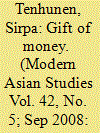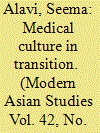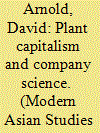|
|
|
Sort Order |
|
|
|
Items / Page
|
|
|
|
|
|
|
| Srl | Item |
| 1 |
ID:
084842


|
|
|
|
|
| Publication |
2008.
|
| Summary/Abstract |
This article examines the rise of dowry system in Janta, a West Bengali village in the Bankura district, where the dowry payments are a relatively new phenomenon. The oldest generation in Janta had experienced times when no demands for money or other gifts had been made during marriage arrangements, but since the 1950s huge dowry payments have become the central financial transactions in the region. In addition to oral history interviews on dowry practices, I draw from my research on the changes in caste, gender and class relationships in the village. I argue that the dowry payments do not merely represent economic considerations in a class conscious society, but that they reflect a rearticulation of both the tradition and market, of gender, ritual, and class identities, and that paying attention to the multiplicity and local variation of dowry practices provides a key to its
|
|
|
|
|
|
|
|
|
|
|
|
|
|
|
|
| 2 |
ID:
084837


|
|
|
|
|
| Publication |
2008.
|
| Summary/Abstract |
The essay explores a Greco-Arabic healing tradition that arrived in India with the Muslims and evolved with the expansion of the Mughal Empire. It came to be known as unani in the sub-continent. It studies unani texts and its practitioners in the critical period of transition to British rule, and questions the idea of 'colonial medicine' being the predominant site of culture and power. It shows that in the decades immediately preceding the early 19th century British expansion, unani underwent a critical transformation that was triggered by new influences from the Arab lands. These changes in local medical culture shaped the later colonial intrusions in matters related to health. The essay concludes that the pro-active role of the English Company and the wide usage of the printing press only added new contenders to the ongoing contest over medical authority. By the 1830s this complex interplay moved health away from its previous focus on individual aristocratic virtue, to the new domain of societal well being. It also projected the healer not merely as a gentleman physician concerned with individual health, but as a public servant responsible for the well being of society at large. These changes were rapid and survived the reforms of 1830s. They ensured that 'colonial medicine' remained entangled in local
|
|
|
|
|
|
|
|
|
|
|
|
|
|
|
|
| 3 |
ID:
084839


|
|
|
|
|
| Publication |
2008.
|
| Summary/Abstract |
To what extent did legal notions of identity conceal more porous and dynamic social relationships experienced outside of court? This article reconstructs events surrounding a famous court case, Abraham v. Abraham (1863), involving a property dispute within a mixed race family from Bellary, South India. Using the case's original documents it presents a narrative about the Abraham family, highlighting their negotiations of identity within the domains of family, market and law. The narrative shows how Indians, even under colonialism, could experience far more dynamic and flexible boundaries than what is often portrayed in the literature on communalism. At the same time, it demonstrates the very real impact of personal law categories upon the choices and litigation strategies of Indians. Indians had real agency in crafting their identities, but only as they adopted the conceptual tools of the colonial judiciary to pursue their interests.
|
|
|
|
|
|
|
|
|
|
|
|
|
|
|
|
| 4 |
ID:
084843


|
|
|
|
|
| Publication |
2008.
|
| Summary/Abstract |
This article argues that villagers' weakened trust in local governments has caused the officials to develop new strategies to cooperate with people and groups who enjoy traditional forms of authority. More specifically, the article shows how the officially established Old People' Associations in some areas have gained political influence far beyond what their official status as an "NGO" (minjian zuzhzi) would warrant. Villages of Fujian have a long history of being organised around patrilinear lineage organisations, and especially the older men still enjoys authority among the population. Local authorities, as well as business people, are therefore actively trying to engage and mobilise this traditional senior authority for their own political and economic purposes, thereby creating new relations of local power.
|
|
|
|
|
|
|
|
|
|
|
|
|
|
|
|
| 5 |
ID:
084838


|
|
|
|
|
| Publication |
2008.
|
| Summary/Abstract |
The career of the Danish-born botanist Nathaniel Wallich, superintendent of the Calcutta Botanic Garden from 1815 to 1846, illustrates the complex nature of botanical science under the East India Company and shows how the plant life of South Asia was used as a capital resource both in the service of the Company's economic interests and for Wallich's own professional advancement and international reputation. Rather than seeing him as a pioneer of modern forest conservation or an innovative botanist, Wallich's attachment to the ideology of 'improvement' and the Company's material needs better explain his longevity as superintendent of the Calcutta garden. Although aspects of Wallich's career and botanical works show the importance of circulation between Europe and India, more significant was the hierarchy of knowledge in which indigenous plant lore and illustrative skill were subordinated to Western science and in which colonial science frequently lagged behind that of the metropolis.
|
|
|
|
|
|
|
|
|
|
|
|
|
|
|
|
| 6 |
ID:
084840


|
|
|
|
|
| Publication |
2008.
|
| Summary/Abstract |
A figure in part a foreman, in part a headman, and in part a recruiting contractor, formed an indispensable part of labour organization in mills, mines, ports and plantations in nineteenth-century India, and in the tropical colonies where Indian emigrants went for work. Historians have explained the presence of such a figure by the needs of capital for intermediaries, or needs of labour for familiar relationships in an unfamiliar environment. The significance of the labour agent for economic history, however, seems to go beyond these needs. The universal presence of a worker who embodied a variable blend of roles prompts several larger questions. Was the labour agent an institutional response to an economic problem? Were modern forms of agency rooted in older modes of labour organization? The scholarship discussed the gains for employers. Were there costs too? This paper is a preliminary attempt at framing these larger issues. I suggest here that the agent had roots in the traditional economy, and represented an incorporation of putting out and the authority of the headman inside modern work sites, and that this incorporation of traditional authority in a modern setting gave rise to contradictions.
|
|
|
|
|
|
|
|
|
|
|
|
|
|
|
|
| 7 |
ID:
084841


|
|
|
|
|
| Publication |
2008.
|
| Summary/Abstract |
This paper uses a study of strikes of railway workers in Bihar and Bengal from 1918 to 1922 to set out and examine the complexities of workers' politics. Three broad themes related with workers' politics, viz. racial ideology, actual 'event' of striking and the related activities of workers, and techniques of mobilization have been covered in this paper. In each of these cases, it has been argued that rigid categories like racialism or nationalism are of little help in unravelling the complexities of workers' choices and their politics. Their politics were more flexible than what meets the eye, and their choices were created through dialogue, if not determined by the various factors surrounding them. However such choices were also being limited by the larger context provided by the ideologies and institutions of racialism, nationalism, and colonialism.
|
|
|
|
|
|
|
|
|
|
|
|
|
|
|
|
|
|
|
|
|